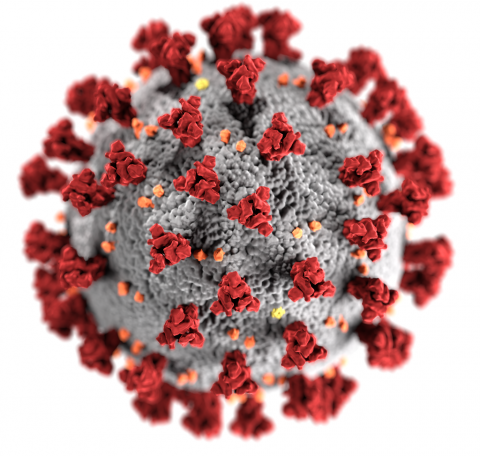
Research tool for SARS-CoV-2 under development in the Virology and Molecular Immunology Unit
The REACTing consortium, which is made up of the key research institutions in France and which is coordinated by Inserm, aims to organise scientific research both in times of an epidemic and between epidemics in order to be better prepared for them. The consortium, which was already in operation during the Ebola and Zika epidemics, launched a call in early 2020 for proposals to fund projects aimed at combating the current Covid-19 epidemic. Here, we focus on one of the projects selected which is led by Jean-François Eléouët of the Virology and Molecular Immunology Laboratory (VIM - Université Paris-Saclay, UVSQ, INRAE): ‘The development of a replicon for the Covid-19 coronavirus’.
Working in a research laboratory for SARS-CoV-2, or the severe acute respiratory syndrome coronavirus 2 which has caused the Covid-19 pandemic, is no easy task. Like any pathogen, its handling is subject to strict safety guidelines to protect handlers. The aim of the project led by Jean-François Eléouët (for which he has received 30,000 euros from the Ministry) is to develop a replicon of the virus. This is a very specific genome of the virus which allows it to be studied without any risk. To do this, the scientist designed and had synthesized an RNA molecule which contained all the genetic information of the virus, with the exception of the parts encoding the structural proteins of the virus (its envelope). Once this modified genome has been introduced into a cell, it should be able to replicate itself. However, without the proteins present in the envelope, it will be impossible for the RNA molecules produced to leave the cell! As a result, there is no risk of producing viral particles and infecting new cells.
The replicon as a working tool for the greatest number of people
“Research work on this pathogenic virus must be carried out in a level 3 laboratory where the safety is sufficiently high. However, not all research sites have these facilities. The relevance of our project is that laboratories which do not have these facilities can use the tool we have developed to search for inhibitors of the virus, for example,ˮ explains Jean-François Eléouët. “As a starting point in the creation of this replicon, I used those developed during the 2003 SARS-CoV-1 epidemic and papers on that particular virus.ˮ
The involvement of a team specialising in pneumoviruses
The ‘Molecular biology of pneumoviruses’ team lead by J.F. Éléouët usually studies respiratory viruses responsible for bronchiolitis. These pneumoviruses are a little different to coronaviruses. Although in both cases their genome consists of RNA, that of coronaviruses is directly translated into proteins, whereas this translation requires an additional step in pneumoviruses. “Apart from that, they are viruses that are similar in many ways. They are both enveloped viruses - they have a membrane -, infect respiratory epithelial cells and replicate in the cytoplasm of the cell,ˮ explains the scientist.
Research at the time of the coronavirus - an altered time frame
During this period of crisis, the speed at which research projects are submitted and at which their evaluation is carried out is unprecedented. “Everything has been accelerated and simplified at all levels. It’s the first time this has happened,ˮ says Jean-François Éléouët. “However, all the money earmarked for research must not just be spent on Covid-19. This would prevent other important projects from being developed,ˮ the scientist is careful to point out. He himself ensures that his team's other projects keep moving forward.
Work on the replicon led by Jean-François Éléouët is expected to start by the end of the month. It will make it possible to determine whether this tool can be commonly applied, and if so, to carry out various projects in order to better understand and combat the SARS-CoV-2 virus.
